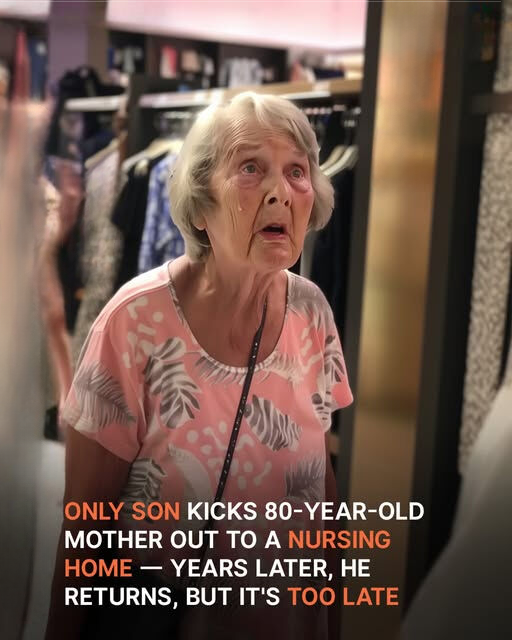
I knew something was wrong the moment I stepped into the living room. My son Henry stood there, hands stuffed in his pockets, eyes fixed on the floor. He wouldn’t even look at me. And I knew—mothers always do—that this wasn’t a normal visit.
“A nursing home?” I repeated, stunned. Saying the words out loud didn’t make them any easier. My chest tightened. “Henry, I don’t need care. I’m managing just fine. I’m not sick or confused. I’m not ready to be locked away with a bunch of strangers and bingo cards.”
He finally met my eyes. “Mom, you don’t understand. This is our only option.”
I looked around my little home—the clean counters, my neat bookshelf, the untouched knitting by my armchair. I wasn’t falling apart. But he had already made up his mind.
“Will you visit?” I asked softly. “Just sometimes. Weekends, maybe?”
“Of course,” he said, flashing that practiced smile he used at work. “You can count on it.”
But I couldn’t.
He came once. Then a few months passed. Then nothing.
Three years later, Henry finally remembered I existed. He’d gotten engaged, and something about settling down stirred up guilt. He wanted to apologize, to reconnect, to tell me the news.
But when he arrived at the nursing home, I was gone.
“Mrs. Dawson?” the receptionist said, checking her screen. “She left two years ago. Here—this is the address on file.”
The home Henry picked for me wasn’t terrible—but it wasn’t a life, either. It smelled like bleach and boiled vegetables. People walked in circles, forgetting what day it was. I played along, but inside, I felt invisible.
Until I met Nora.
She was recovering from a fall—smart, sharp, and done with pretending she was fragile. We bonded instantly over crossword puzzles and bad coffee.
“Why are you really here?” she asked me one night.
“My son said there was no other choice.”
“And you believed him?”
I didn’t answer. I didn’t have to.
That conversation changed everything.
With Nora’s help—and a social worker named Diane—I started asking questions. We reviewed documents. I found out Henry had power of attorney… and he’d used it to dip into my retirement savings. To fund an investment, no less.
It didn’t make me angry. Just… hollow.
I revoked his access. With Nora’s help, I moved into a small cottage by a lake—her niece owned it and needed a tenant. I started fresh. Grew tomatoes. Adopted a dog. Joined a book club. Tutored kids at the local library.
And for the first time in years, I felt like me again.
Two years later, a car pulled into my gravel driveway on a quiet Saturday.
Henry stepped out, hesitant. He looked older, thinner. His voice cracked when he saw me.
“Mom… they said you left. I didn’t know where to find you.”
I stood on the porch, garden gloves in hand. “You found me now.”
He looked around. “You look… really good.”
“I feel good,” I said. “Better than I ever did in that place you left me.”
He dropped his gaze. “I thought I was doing what was best. I was overwhelmed. Lisa—my fiancée—asked about you, and I realized I didn’t have a good answer. That’s when I knew I messed up.”
I looked at the man in front of me—the one I raised, the one who forgot me. And maybe, just maybe, the one who had started to remember.
“I didn’t disappear, Henry,” I said. “I just stopped waiting.”
He sat on the steps. “Can I come in?”
I hesitated, then nodded. “If you make the tea.”
He laughed—an old, familiar sound. And for the first time in a long time, we talked. About the past, yes, but also the future.
He began visiting regularly. Brought Lisa, who hugged me like family. They asked if I wanted to move in with them.
“I’m happy here,” I told them. “But you’re always welcome.”
And he meant it. Every Sunday, Henry came by. We’d garden, cook, or simply sit by the water. That was enough.
I lost years to silence. But I gained something better: the life I chose—and a son who finally showed up.
Sometimes, we have to walk away to be truly seen.
And sometimes, it’s the leaving that leads to being found.
If this touched you, share it with someone who needs to believe in second chances. Because it’s never too late to begin again. ❤️